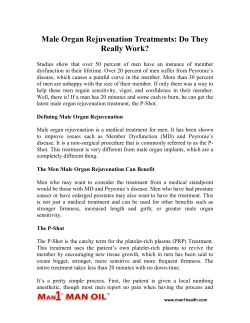
Can Shockwaves Shock the Member Dysfunction Out of a Male Organ - Let’s See!
Can Shockwaves Shock the Member Dysfunction Out of a Male Organ? Let’s See! Male organ lost a little of its lightning? Shockwaves could be the answer to the member dysfunction problem. This still very new treatment was first tested in 2010 and has grown in popularity steadily since. Some herald this treatment as a savior for men suffering from a loss of sensitivity in their male organ. Others say it’s merely a placebo effect. Who’s right? Let’s take a look. Member Dysfunction: Established Treatment Methods Twenty years ago, the FDA approved the little blue tablet (and its other friends) to fight weak hard-ons and member dysfunction. Injections to the midsection also were found to help. However, all are short-term solutions. They also can create awkward or stale bedroom situations, as a man has to take his little blue tablet before lovemaking, making it impossible to be spontaneous, which sometimes kills the mood. A longer-term solution, sensual organ implants, have been successful for some of the men who find they don’t help with loss of sensitivity. One solution for them has been sensual organ implants, but unless the root cause is addressed, even those are a quick fix. Member Dysfunction: Shockwave Therapy Researchers have been working tirelessly to help men with member dysfunction restore their ability to get hard on their own without having to plan boudoir time. The newest solution on the block is shockwave therapy. Shockwave treatment is different from other treatments because it could cure member dysfunction. www.man1health.com Shockwave treatment has been used to treat other things like kidney stones or cardiovascular issues. Low-intensity energy waves are sent to the body part the doctor’s target. The shockwave then promotes the growth of new blood vessels rising from the ash of the old ones. These new vessels, it is thought, will bring more blood to the male organ, thus producing a hard-on. The procedure is not as painful as one may think, even in the holiest of all holy areas. As for results, the first clinical trial of 10 men found that 10 of them didn’t need to use the little blue tablet to get hard 6 months after the trial. Several smaller studies have since been published on the topic. Those studies also showed promise. Some researchers suggest that shockwave therapy isn’t as efficacious as it is thought to be. Many of the studies boil down to the placebo effect because the patient knows they are being treated, which can lead to inaccurate findings. They argue that randomized trials are more accurate. Of the 5 studies currently being conducted, 2 show benefit, 2 find no benefit, and 1 can’t be interpreted. Other complications holding up shockwave therapy are the unknowns. How many sessions should someone have? How long should they be? What part of the male organ should be targeted? The study regarding shockwave therapy for member dysfunction found that it was only helpful to those men with mild member dysfunction. That success also declines over time, with only half of the patients keeping the response after 2 years. How to Get Shockwave Treatment This is the tricky part. Shockwave therapy for member dysfunction is not FDA-approved. The only way a man can safely try it is to sign up for a clinical trial. However, there are, of course, plenty of fake devices riding on its coattails. Scientists warn of these devices, which merely produce www.man1health.com vibrations. In short, find a trial or wait out the FDA. You don’t want to trust just anyone with the family jewels. In the meantime, many men with member dysfunction have found something else that works. By using a male organ health oil (health professionals recommend Man 1 Man Oil, which has been clinically proven safe and mild for skin) that has been created expressly for delicate sensual organs skin regularly, they have regained sensitivity and restored their intimate life. With ingredients like vitamin C and L-arginine, both known blood flow enhancers, they can keep a man’s flagpole standing straight. Use daily or more if desired. www.man1health.com
© Copyright 2025









